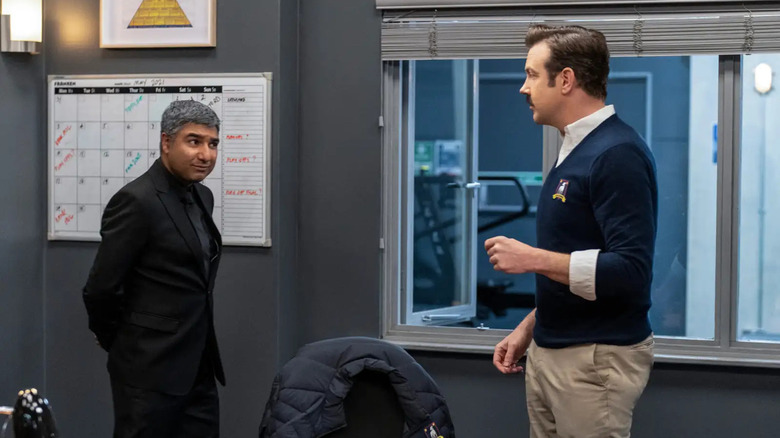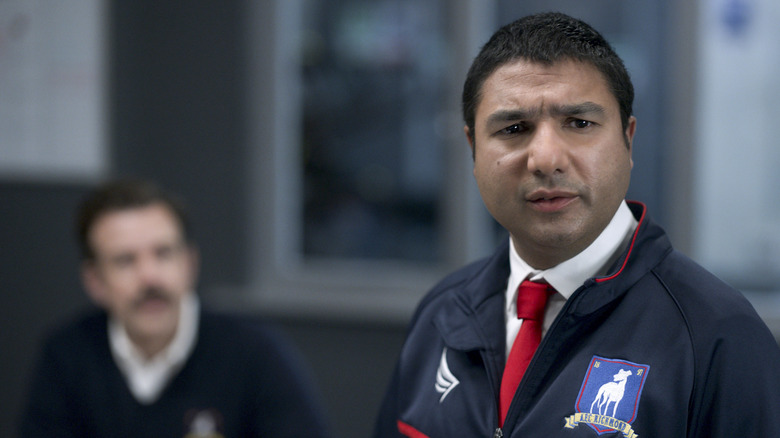Ted Lasso's Writers Knew The Season 2 Backlash Was Coming
Although season 1 of "Ted Lasso" was almost universally hailed as a fantastic opening season, the response to season 2 wasn't quite as positive. It was too slow, many said, and at times the wholesomeness of season 1 leaned too far into sappiness territory. The big problem, however, was how "Ted Lasso" had lost its main narrative hook. Season 1 was a simple, easily-enjoyed story about how Ted (Jason Sudeikis) changed everyone's outlook on life through the sheer power of friendliness and optimism. Most of the characters started the show wanting to hate Ted, but by the season finale, he'd firmly won them all over. So ... now what?
By necessity, season 2 took a more complicated approach. It explored the limits of Ted's optimism. Here Ted struggles to navigate the regular presence of a team therapist, his team doesn't improve as quickly as he'd hoped, and his once-trusted assistant coach Nate (Nick Mohammed) becomes increasingly power-hungry and untrustworthy. None of this is quite as wholesome or satisfying as season 1's approach of letting Ted win a new person over each episode, but maybe it's what a show like this needs to set up a satisfying three-season arc.
It's why the show's writing staff went into season 2 expecting blowback, and when the blowback came, they didn't let it affect any of their long-term plans. As showrunner Bill Lawrence explained in a 2021 interview before the season's premiere: "I've been doing this for a long time. It's a writers' room joke with me and the staff and it'll be true or it's not. I'm like, 'Everybody set your alarms for the 'Ted Lasso' Season 2 backlash. It's not that good.'"
Not his first second season
Further discussing the backlash, Lawrence said, "I think it's just part of the game ... if you're writing and doing shows completely based on the response you're hoping you're gonna get, you're not going to succeed because you're gonna be surprised both positively and negatively about it."
Lawrence has a lot of showrunning experience to back up this sort of advice. Most notably, he was the showrunner of "Scrubs," which featured a second season that most fans today agree was pretty damn strong. The show was still finding its voice a little, but this was the season where the writers figured out exactly what they wanted to do with each of their characters, and the dynamics between the cast settled into that comfortable sweet spot they'd mostly stay in throughout the next few seasons.
Season 2 of "Ted Lasso" feels the same way. Years from now when we look back at all the main characters in this show, we'll likely remember them as they were here. It's almost hard to believe that Rebecca (Hannah Waddingham) used to be a bitter, closed-off woman solely focused on revenge against her ex-husband, just as it's hard to think of Jamie (Phil Dunster) as the arrogant bully he was introduced as. Whereas season 1 was all about the character's making the leap to become the better people we'd come to know them as, season 2 is all about them trying to hold onto the progress they've made, to avoid backsliding. That brings us to Nate, the one big exception to season 2's rule.
Season 2's stroke of genius
Nate was one of the most likable characters in season 1, but he was also one of the least interesting. The trope of the awkward, put-upon nice guy who slowly develops some confidence and finds his groove is well-trodden ground by this point. For the most part, season 1's predictability was never a bad thing — we knew Ted would win everyone to his side from the start, and it was fun to see him gradually pull it off — but Nate's arc in season 1 was maybe a little too predictable, a little too easy.
That's why the show's decision to take Nate in a dark direction in season 2, in stark contrast to nearly all the other characters, was such a breath of fresh air. It's a surprisingly cynical storyline in a show that otherwise regularly crosses the line into being a little too wholesome and sappy. It's a plot point that serves as a direct challenge to Ted's whole philosophy on life, as it was Ted's initial kindness and openness that seems to have given Nate the confidence to betray him in the first place.
It's a controversial storyline with its fair share of detractors, but it also sets up season 3 perfectly as the show's climactic conclusion. If nothing else, it's promising to see that the "Ted Lasso" writers didn't plan to change their approach at all in response to season 2's inevitable backlash. "We mapped out a three-season story," Bill Lawrence explained. "This specific story, we mapped out the beginning, the middle and the end of it. We aren't veering from that."


